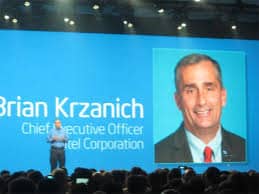Leader
International Paper (IP) CEO Mark Sutton is the real deal. A 30-year IP employee, he has managed to redirect this 117 year-old institution from simple paper (think office supplies) to packaging (think of all those Amazon boxes).
Through skillful and strategic divestitures and acquisitions, Sutton unloaded underperforming legacy operations (beverage packaging and wood products) while picking up those visionary directions (again with the Amazon boxes. Plus UPS, Fedex, et al) that are the forward-thinking antithesis of Intel, this month’s Laggard.
The paper business has a tough history. I’ve been in a few paper mills; it’s a real “heavy industry” environment, and well, the aromatic challenge is significant. They don’t smell like roses. It’s manufacturing at its core, and the people working there earn every dime.
Sutton’s approach to visionary success is different than most large-company manufacturing CEOs. He didn’t do it by focusing on bricks, mortar, and fast dollars; he took a simple, leadership centric approach.

Say what?! That’s crazy talk coming from a manufacturing boss, who went on to say “…the real differentiator for long-term value creation is people.” Not assets, not creative financing, not outsourcing jobs to China. People.
The success of IP is obvious and notable. The stock price has nearly doubled in four years, productivity is up 40+%, driving earnings up as well. This guy knows what he’s doing. It’s hard not to write a tome praising this guy—both his approach and results. I’ll end with a quote from him we would all do well to remember:
Mark Sutton is the real deal, and an exemplar. And he’s this month’s Leadership Leader.
Milquetoast
We left Volkswagen alone for six months to see if they’d learn any lessons from the emissions cheating scandal. No need to rehash ex-CEO Martin Winterkorn’s epic leadership failure, and we’re not surprised that he’s no longer on the Porche and Audi boards, since that’s what we suggested last October.

Normally, it’s the shareholders who rise up like the villagers in Young Frankenstein. Not this time.
Who then, labor? After all, most of VW’s half a million workers don’t get bonuses, and almost all will be affected by slumping sales. Nope.
It was VW CEO Mattias Mueller who actually suggested a reduction in executive bonuses to the board steering committee after the German state of Lower Saxony — a major shareholder — complained. Mueller was eventually able to twist the board’s arm to accept a 30% reduction in bonuses, but they didn’t like it.
How much are we talking about? Well, in 2014, the $61 million in executive bonuses accounted for more than 75% of the executives’ total compensation. Yep, $18 million in base salary plus $61 million in bonuses.
If I were the shareholders, I’d be pissed about their base salary, too. And I might storm the castle if any executive got a bonus while the emissions scandal was still unresolved.
So good on Mueller for bringing the proposal forward. Shame on both he and the board for feeling entitled to the fat share of the spoils. A lost opportunity to for a leadership team to take accountability and show they care about the serfs.
The only thing this executive board deserves to share is April’s Leadership Milquetoast award. Prosit!
Laggard

Okay, that’s not entirely fair; their vision is so short-sighted that the strategy that’s based on it is taking them down the tubes.
CEO Brian Krzanich, the “safe pick” to move from COO to CEO in 2013, announced the cuts last week as an effort to be more efficient and invest in areas like data centers, memory, and the internet of things.
Not to worry, says Stacy Smith, just named to move from CFO to de facto COO, “we’re in the midst of this transformation and we’re executing well through it.” Their new strategy will take them from being the “heart of the PC to the heart of the Cloud,” says Smith.
That’s some bold thinking, considering declining PC sales — at least the prediction of it — is so last decade.
Just like culture, the failure of a company to recognize and understand changes in the market and their external environment falls squarely at the leader’s feet. Intel’s conservative culture has made them slow to adapt to both, doing more of the same in a down market.
What’s the evidence? Just this past January, Krzanich (who, with Smith, have more than 60 years combined at Intel), declared 2016 to be a macroeconomic copy of 2015 and identified robotics, automation and integration as “next emerging trends.” He also predicted that industrial use of drones could really take off (pun intended).
Wow! Or as the English would say, “Brilliant!”
Having missed out on the smart phone and tablet markets, Intel’s leadership completely misjudged the speed people would abandon PCs and is late to need identifying development opportunities beyond the cloud like artificial intelligence and virtual reality.
It’s possible that the introduction of new blood in the form of a President for the Internet of Things could turn Intel from its seemingly dogmatic culture. After all, past performance doesn’t guarantee future returns.

Thanks, Mr Krzanich. Intel’s culture may have eaten its strategy for breakfast, but it can’t have been a very satisfying meal. For that you get to be April’s Leadership Laggard.

